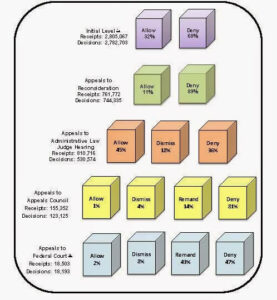
When a claim is denied by an Administrative Law Judge (ALJ), the claimant has the option of seeking Appeals Council review. A Request for Appeals Council review must be made within 60 days of the receipt of the unfavorable ALJ decision.
For the Appeals Council to grant review, the claimant must show that the ALJ abused his discretion in some respect, made an error of law, or made a finding of fact which is not supported by substantial evidence. The Appeals Council will not reverse an ALJ decision merely because a more liberal person would have awarded it, or there is some supportive evidence. Normally, the claimant submits a very short and concise statement explaining what the error consists of.
An abuse of discretion is a judgment call that is so indefensible that no reasonable person could have made it.
Errors are of law are not as uncommon as you may think. Many judges do not understand the legal standard for assessing complaints of pain, for example. Other times, judges do not do things that they are required to do by the agency’s regulations. These include making a detailed assessment of all physical and mental limitations, assessing the credibility of all medical opinion evidence, assessing the claimant’s credibility, and making findings about medical conditions that are brought to their attention.
Substantial evidence does not mean the same thing as the preponderance of the evidence. A finding of fact will be found to have been supported by “substantial evidence” if the judge had something to hang his hat on. It does not have to be much. However, a finding of fact cannot be totally unsupported by anything in the evidence. If nothing supports the finding, it is not supported by “substantial evidence.” Findings of fact are statements such as: “the claimant can stand and walk for six of eight hours.” The broad conclusion that a claimant is disabled, or not disabled, is not a finding of fact. It is a conclusion of law, which is derived from underlying findings of fact.
The Appeals Council can only consider new evidence if it pertains to the period before the date of the judge’s decision.
Seven times out of eight, the Appeals Council declines to review the matter, without explanation. This normally takes about 15 months. When it does so, the ALJ decision becomes the final decision of the agency, subject to review by a United States District Courts. Most cases denied by the Appeals Council do not advance any further, because the Appeals Council review is the last administrative appeal available.
Contact our social security disability lawyers today
(864) 235-0234When the Appeals Council does reverse Administrative Law Judge, it remands the claim back to the same judge, for a second hearing. This gives the judge an opportunity to correct the error. It does not necessarily mean that the judge will award the claim. The judge is required only to consider certain matters pointed out by the Appeals Council, and make a new decision.
Call or text (864) 235-0234 or complete a Free Case Evaluation form





